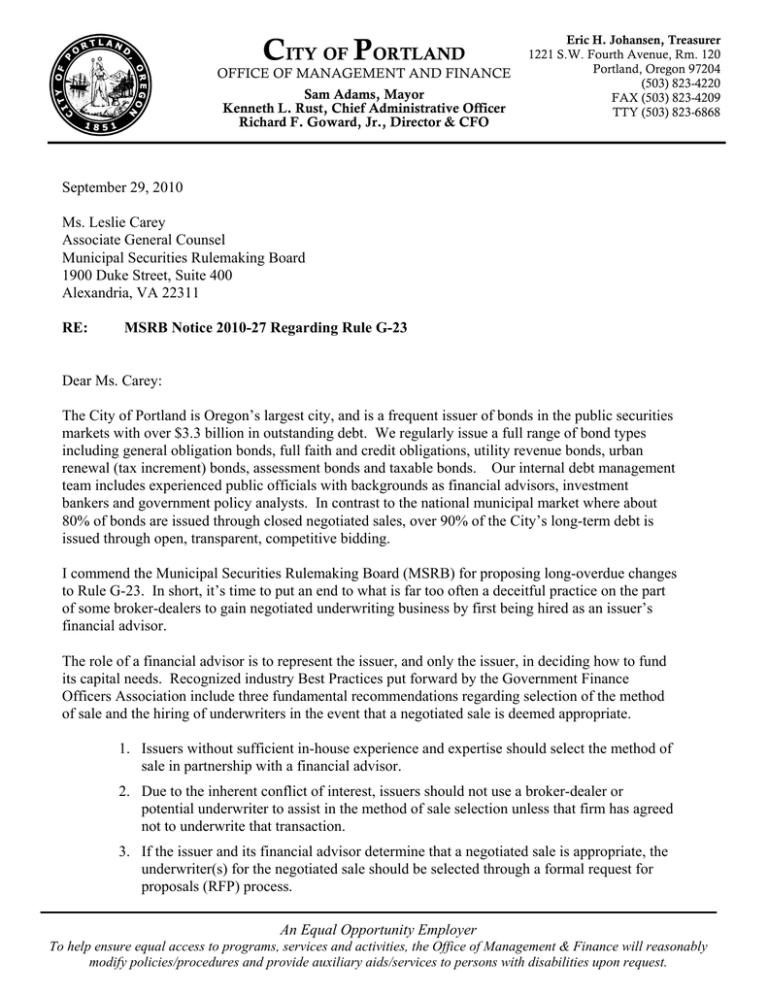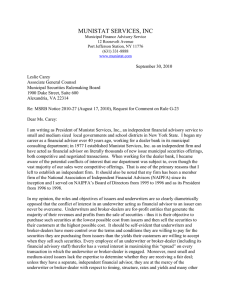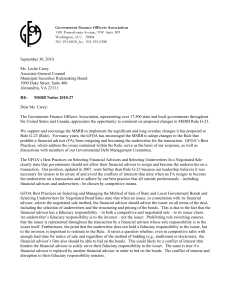C P ITY
advertisement

CITY OF PORTLAND OFFICE OF MANAGEMENT AND FINANCE Sam Adams, Mayor Kenneth L. Rust, Chief Administrative Officer Richard F. Goward, Jr., Director & CFO Eric H. Johansen, Treasurer 1221 S.W. Fourth Avenue, Rm. 120 Portland, Oregon 97204 (503) 823-4220 FAX (503) 823-4209 TTY (503) 823-6868 September 29, 2010 Ms. Leslie Carey Associate General Counsel Municipal Securities Rulemaking Board 1900 Duke Street, Suite 400 Alexandria, VA 22311 RE: MSRB Notice 2010-27 Regarding Rule G-23 Dear Ms. Carey: The City of Portland is Oregon’s largest city, and is a frequent issuer of bonds in the public securities markets with over $3.3 billion in outstanding debt. We regularly issue a full range of bond types including general obligation bonds, full faith and credit obligations, utility revenue bonds, urban renewal (tax increment) bonds, assessment bonds and taxable bonds. Our internal debt management team includes experienced public officials with backgrounds as financial advisors, investment bankers and government policy analysts. In contrast to the national municipal market where about 80% of bonds are issued through closed negotiated sales, over 90% of the City’s long-term debt is issued through open, transparent, competitive bidding. I commend the Municipal Securities Rulemaking Board (MSRB) for proposing long-overdue changes to Rule G-23. In short, it’s time to put an end to what is far too often a deceitful practice on the part of some broker-dealers to gain negotiated underwriting business by first being hired as an issuer’s financial advisor. The role of a financial advisor is to represent the issuer, and only the issuer, in deciding how to fund its capital needs. Recognized industry Best Practices put forward by the Government Finance Officers Association include three fundamental recommendations regarding selection of the method of sale and the hiring of underwriters in the event that a negotiated sale is deemed appropriate. 1. Issuers without sufficient in-house experience and expertise should select the method of sale in partnership with a financial advisor. 2. Due to the inherent conflict of interest, issuers should not use a broker-dealer or potential underwriter to assist in the method of sale selection unless that firm has agreed not to underwrite that transaction. 3. If the issuer and its financial advisor determine that a negotiated sale is appropriate, the underwriter(s) for the negotiated sale should be selected through a formal request for proposals (RFP) process. An Equal Opportunity Employer To help ensure equal access to programs, services and activities, the Office of Management & Finance will reasonably modify policies/procedures and provide auxiliary aids/services to persons with disabilities upon request. The existing rule G-23, which allows an alleged financial advisor to resign from a transaction in order to serve as underwriter for a negotiated sale of the bonds, stands in direct conflict with each of these recognized best practices. It is not difficult to see the conflict of interest in having a broker-dealer serve as an issuer’s financial advisor if that firm is not precluded from underwriting a subsequent negotiated sale of bonds. Can a finance officer and the public be sure that an issuer is receiving unbiased advice regarding the method of sale when the broker-dealer financial advisor is allowed to resign in order to underwrite a negotiated sale? Did the broker-dealer financial advisor recommend a negotiated sale based on a rigorous analysis of the relevant rating, security and structure characteristics of the proposed bonds as the GFOA advises, or was the recommendation made in order to obtain more profitable negotiated underwriting business for the broker-dealer? While one can debate the broker-dealer’s motivation in recommending a negotiated sale, if that firm is allowed to resign in order to underwrite the negotiated sale, the issuer is subject to criticism, and deservedly so, for allowing this conflict of interest to exist. The MSRB in proposing its revision to Rule G-23 can put an end to this practice, With respect to the 7 questions posed by the MSRB in Notice 2010-27, I note that each of the situations described can be avoided by an issuer electing to hire an independent financial advisor, meaning one that is not affiliated with a broker-dealer. For many years, it has been the City of Portland’s practice to hire only independent financial advisors. This practice has served the City very well as it provides greater assurance of conflict-free advice while eliminating many of the hypothetical issues identified in the MSRB’s questions. After 28 years of experience in public finance, I believe that issuers are best served when they clearly and distinctly separate the roles of financial advisor and underwriter. In short, hire independent financial advisors to provide financial advice and only hire broker-dealers to underwrite bonds. While investment bankers may provide helpful services that are advisory in nature on a negotiated sale, issuers should not lose sight of the fact that the issuer’s interests are different from those of the underwriter. A quality, truly independent financial advisor provides the issuer with advice that is untainted by other business relationships. I look forward to the proposed revisions to Rule G-23 and well as to other changes facing the MSRB. It is my hope that the future composition of the Board membership will, in fact, strike a true balance between broker-dealers, independent financial advisors, state and local government officials and members of the public. Finally, I look forward to the continued opportunity to comment on future proposals before the MSRB as such proposals frequently impact the City’s ability to provide its taxpayers and ratepayers with services at the lowest possible cost. Sincerely, /s/ Eric H. Johansen Eric H. Johansen, Treasurer City of Portland, Oregon






